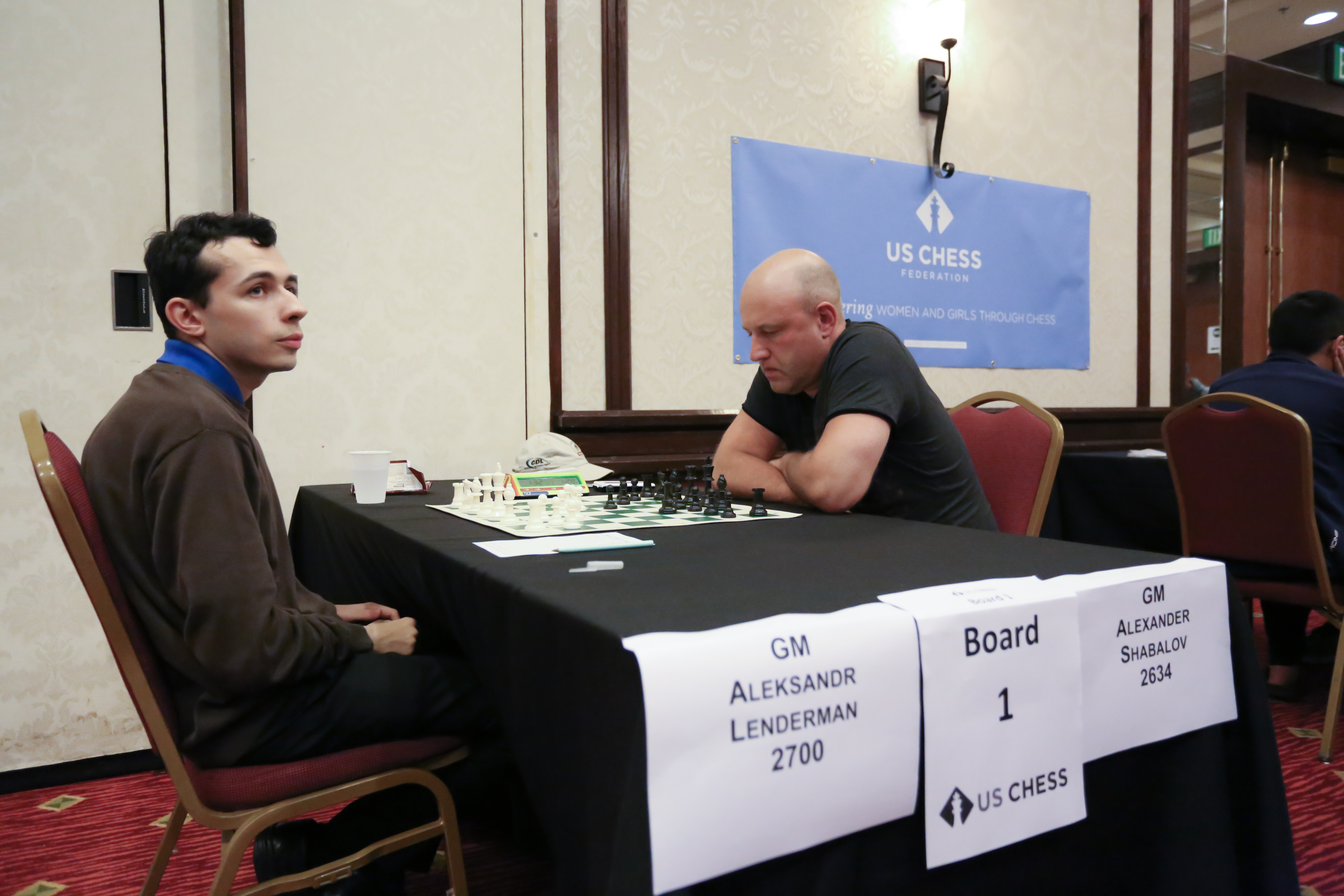 Photo Anne Buskirk
Photo Anne Buskirk
Takeaway 1: Material Matters
Sometimes, in chess, greed is punished mightily. Other times, however, avarice can be richly rewarded. Take for example the following round 8 game, which turned out to be extremely critical in the standings. GM Alexander Shabalov spent a few tempi with the queen in the middlegame in order to grab a solitary pawn, after which he never let go of the reins. Without this victory, Shaba wouldn’t have been in contention for first in the final round.
[pgn][Event "2016 US OPEN"] [Site "Indianapolis, Indiana"] [Date "2016.08.06"] [Round "8"] [White "Shabalov, Alexander"] [Black "Bryant, John"] [Result "1-0"] [ECO "C66"] [WhiteElo "2634"] [BlackElo "2550"] [Annotator "Karagianis,Pete"] [SetUp "1"] [FEN "1r1qr1k1/p1p2pp1/1p3bnp/8/2PP4/P4BB1/2Q2PPP/3RR1K1 w - - 0 22"] [PlyCount "9"] [EventDate "2016.??.??"] [Source "MonRoi"]22. Qa4 Rxe1+ 23. Rxe1 a6 ({Actually, it was better to try to save the material. Black may have "seen a ghost" and worried he may lose the exchange after:} 23... a5 24. Qc6 Qxd4 25. Qxc7 Rf8 {and here, black may have feared:} 26. Bd6 {Which appears to trap the rook. However, he has an escape route.} Bd8 {A hard move to visualize.} 27. Qc6 Be7 {! Again, tough to see from afar. Using the weak back rank to save the rook.}) 24. Qxa6 Bh4 25. Qa7 Bxg3 26. hxg3 {And up a pawn, Shabalov was able to convert.} 1-0[/pgn]
Takeaway 2: The Traditional Schedule Should Never Die
If you caught my article in the most recent (August, 2016) Chess Life, you’ll know that I have no issue lumping the word “dystopian” and “American Open Swiss” in the same sentence. I find the typical weekend Swiss to be painful, exhausting, brutal, and so on and so forth and insert your preferred adjective of pain here. But the US Open was the exact opposite - relaced, friendly, welcoming. I loved the lazy schedule. Even the six-day, which I partook in, felt easier, less tiring. I think chess, as a whole, benefits from this sort of atmosphere, where people leave the tournament with a smile and a memory instead of drooping eyes and two days of malnourishment. #justsaying.
Takeaway 3: Bid Adieu to Her Majesty
Queens are soooooo overrated. Amirite? It’s OK. I’m right. Take, for example, the round 8 encounter between NM Nicky Korba and GM Kayden Troff:
[pgn][Event "2016 US Open"] [Site "?"] [Date "2016.08.11"] [Round "?"] [White "Korba, Nicky"] [Black "Troff, Kayden"] [Result "0-1"] [Annotator "Karagianis,Pete"] [SetUp "1"] [FEN "brr3k1/2q3b1/p2pN1p1/6P1/1p2P3/5P2/PPPQ4/1K1R3R b - - 0 1"] [PlyCount "9"] [EventDate "2016.??.??"]{White has just made a piece sacrifice on e6. There are lots of threats near the black king. What should white do?} 1... Qc3 $3 {Here, have a queen! Please! Take me! Adieu, my lady. Farewell. Strangely, this move is actually the only response to keep the balance!} ({A "normal" move will simply not work. } 1... Qe7 2. Nxg7 Kxg7 (2... Qxg7 3. Qxd6) 3. Rh6 Rg8 (3... Rh8 4. Qd4+ Qe5 5. Qa7+ Rb7 6. Qxa6) 4. Qxd6 Qxd6 5. Rxd6 {This looks reallllly bad.}) 2. Nxg7 (2. bxc3 $4 bxc3+ 3. Kc1 cxd2+ 4. Kxd2 Be5) 2... Qxd2 {With the queens off in an efficient maner, black breathes a sigh of relief.} 3. Rxd2 Kxg7 4. Rxd6 Bc6 5. Rh6 Be8 {A big difference - black is in time to defend g6. Troff goes on to win the ending.} 0-1[/pgn]
Not convinced? Alright, alright. I suppose I can’t resist including one of my own games, where I also part with La Dame. Au revoir, ma cherie! [pgn][Event "2016 US Open"] [Site "?"] [Date "2016.08.11"] [Round "?"] [White "Biyiasas, Theodore"] [Black "Karagianis, Petros"] [Result "0-1"] [WhiteElo "2190"] [BlackElo "2302"] [Annotator "Karagianis,Pete"] [SetUp "1"] [FEN "r1b1r1k1/pp3pp1/2p2n1p/4b3/5N2/PRqBB2P/6P1/3QR2K b - - 0 1"] [PlyCount "9"] [EventDate "2016.??.??"]{White has just played Rb3, asking black if they would care to part with the queen. The answer is yes, but in the correct way...} 1... Qxe1+ 2. Qxe1 Bxf4 { Black reaps a might material bounty in exchange for her majesty.} 3. Bb1 (3. Bc4 {to attempt to prevent Nd5 also fails:} b5 {The bishop is pushed off the diagonal.} 4. Bf1 Nd5) 3... Nd5 4. Qd1 Bxe3 5. Qd3 g6 {And having a rook, knight, bishop, and three pawns for the queen, black went on to win.} 0-1[/pgn]
Takeaway 4: Protect Your Calculator!
You know, that gray matter that tries to see ahead and plan and make good moves? THAT calculator. Fashionable headwear was “in” at this year’s open, as you can see by these combatants’ clever style choices. Whether for warmth, comfort, or brain security - headgear was out in full force. 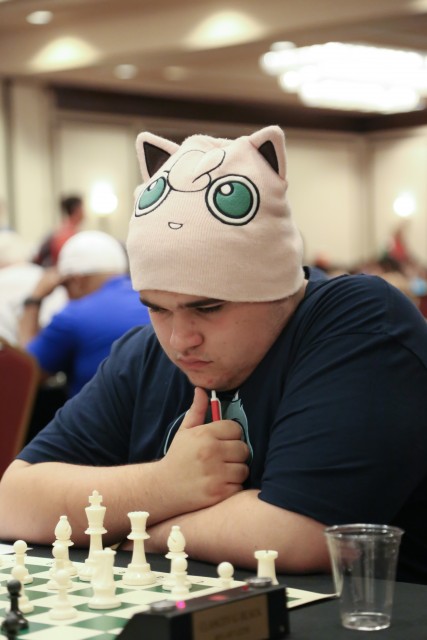
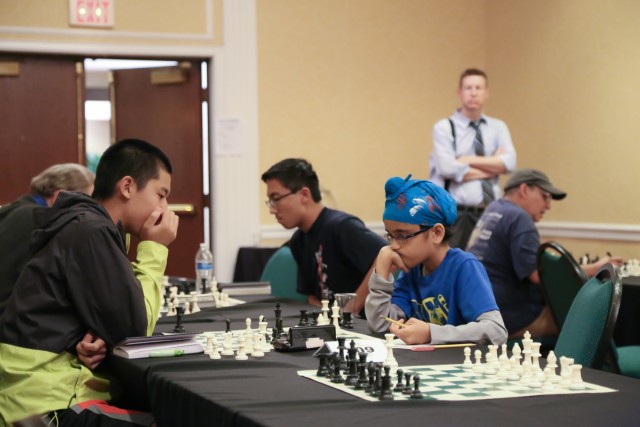
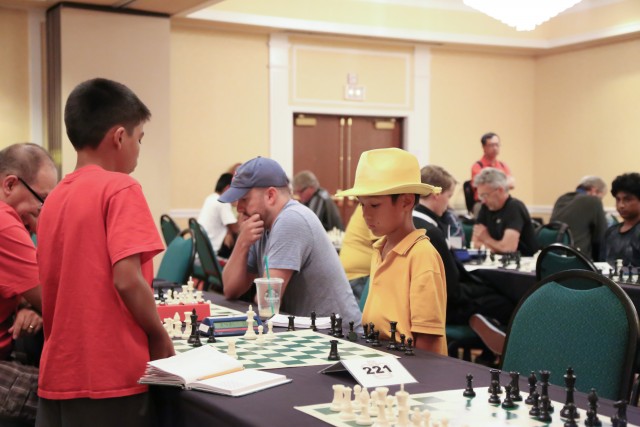
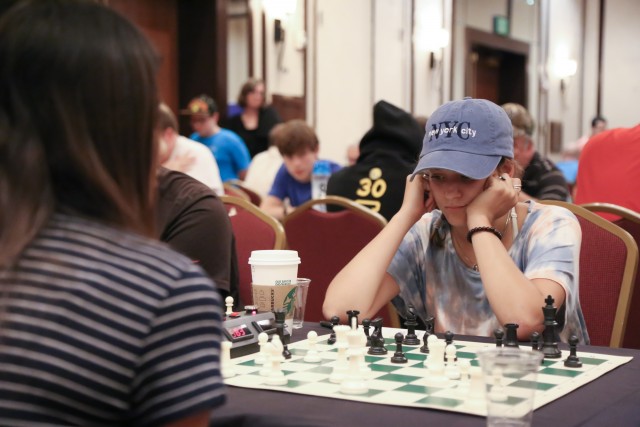
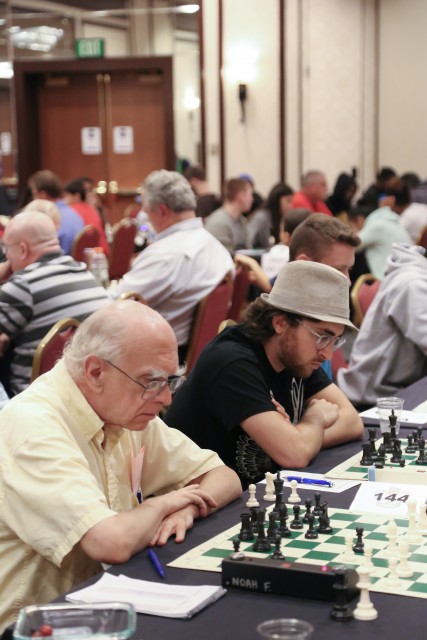
Takeaway 5: Material Doesn’t Really Matter
See what I did there? Right, OK, my snarkiness has achieved an all-time high. But for real, IM Ruifeng Li was, in the words of GM Maurice Ashley, “absolutely on fire” for the first half of the event, tearing through opponents left and right. One such man who tried to stand in his way, IM John Bryant, fell victim to an early and powerful exchange sacrifice.
[pgn][Event "2016 US OPEN"] [Site "Indianapolis, Indiana"] [Date "2016.08.03"] [Round "5"] [White "Li, Ruifeng"] [Black "Bryant, John"] [Result "1-0"] [ECO "C07"] [WhiteElo "2624"] [BlackElo "2550"] [Annotator "Karagianis,Pete"] [PlyCount "139"] [EventDate "2016.??.??"] [Source "MonRoi"]1. e4 e6 2. d4 d5 3. Nd2 c5 4. Ngf3 cxd4 5. exd5 Qxd5 6. Bc4 Qd7 7. O-O Nc6 8. Nb3 a6 9. a4 Nf6 10. Qe2 Bd6 11. Rd1 Qe7 12. Nbxd4 Nxd4 13. Rxd4 e5 14. Rxd6 { A known sac, my database shows it has occured at least 3 times previously, all three games resulting in draws. But Li executes the resulting position very well.} Qxd6 15. b3 Be6 16. Ba3 Qc7 (16... Bxc4 {Was Movsesian-Grover, 1/2-1/2.} ) 17. Nxe5 O-O-O 18. Bxe6+ fxe6 {In exchange for the exchange, white has a pawn, well-placed minor pieces, and a potential target on e6.} 19. Nc4 e5 20. Bb2 Rhe8 21. Bxe5 {Make that two pawns.} Qc5 22. Qe3 Qxe3 23. fxe3 {The e-pawn is isolated but also a passed pawn, and a potential dynamic asset. black also has issues on the dark squares near his king. To this point, the dark square bishop has out-dueled the rook it was sacrificed for.} Kd7 24. a5 Ke6 {A nice plan by black. The king can't be hit on the e-file, and activating the king was a nice concept, useful for the ensuing endgame. Objectively the position is equal, but it "feels" to me like white's position - with the extra pawns - is easier to play.} 25. Bd4 Rf8 26. Nd2 Rf7 27. c4 Kd7 {Black now returns the king to c8, which I'm not as sold on.} (27... h5 {perhaps, to gain space on the kingside.}) 28. b4 Re8 29. Rf1 Kc8 30. b5 Rd7 {It's interesting that even this much later, the black rooks are having issues finding useful roles. A nice long-term positional sacrifice, indeed.} 31. h3 Kb8 32. bxa6 bxa6 33. c5 Kc7 34. Nc4 Re6 35. Rb1 Nd5 36. Rb3 Rde7 37. Kf2 Kc6 38. Nd6 Ra7 39. e4 {Now, the white rook will appear on b6.} Nf6 40. Rb6+ {the position becomes very unpleasant for black.} Kd7 41. Kf3 Ra8 42. Nc4 Rf8 43. c6+ Kc7 44. Bc5 Rf7 45. Bd6+ $1 {White finally cashes in- and is ahead material. So OK, maybe material matters, after all.} Rxd6 46. Rb7+ Kxc6 47. Rb6+ {A nice rook dance to win the rook back in the most effective manner.} Kc7 48. Nxd6 Re7 {Up a passed pawn, and with a6 soon dead, white is able to convert.} 49. Nf5 Re5 50. Rxa6 Kb7 51. Rb6+ Ka7 52. Rb4 Nxe4 53. Kf4 Nc5 54. Kxe5 Nd3+ 55. Ke6 Nxb4 56. Nxg7 Nd3 57. Nh5 Ka6 58. Kf6 Kxa5 59. Kg7 Ne1 60. Nf4 h5 61. Kg6 h4 62. Kg5 Kb6 63. Kxh4 Kc7 64. Kg5 Kd7 65. h4 Ke7 66. h5 Kf7 67. h6 Nc2 68. Ne6 Kg8 69. Kg6 Kh8 70. Ng5 1-0[/pgn]
Takeaway 6: It’s The Little Things That Count
Really, it is. If successful chess play is the accumulation of tiny advantages, then successful tournament organization is the accumulation of all the little things, the nice touches that turn an event from “just a tournament” to a mark-your-calendar-see-you-next-year type thing. A short and incomplete list of several of the “little things” that made a big difference:
- State flags for each of the Denker, Barber, and NGTOC representatives to display during their match
- Frank Niro’s daily tournament Bulletin, printed, and complete with top games
- Constant side events. A weekend swiss, five days of quads, a blitz and a game-15 championship. The tournament truly had a “festival” atmosphere.
- Delegations and committees. Yeah, it’s cool to see how things work, how things are run, and to watch the cogs turn the great wheel that is USChess.
- Awards for attendance. Yes, a “thirty-year award” for US Open attendance was handed out this year.
- The hotel lounge. Seems cliche and obvious, but it was full of chess enthusiasts after every round, sharing a meal, analysis, and the occasional adult beverage.
...If only every US Open was within driving distance.
 Constatine Ananiadis
Constatine AnaniadisTakeaway 7: Tennis Time Vegas has poker, Indy has tennis! Dan Lucas, US Chess Director of Publications and tennis enthusiast describes the event: A group of players took a break from the chess boards to hit the courts at the nearby Indianapolis Tennis Center East. Led by Oberlin Women’s’ Tennis Team Coach Constantine Ananiadis, the August 5 th event included drills, doubles, and singles at the center’s indoor courts. Ananiadis is a 1947-rated US Chess life member (and no slouch in the national tennis rankings: he is the number-two ranked male in the nation in the 40-45 age group). As sponsor of the Oberlin College Chess Team, he was featured in the February 2014 Chess Life’s “Faces Across the Board” column. Al Lawrence wrote then, “Neither of Constantine’s parents played chess, nor was tennis a popular sport in his native Athens. Nevertheless, he became a US Chess life member and A-player, as well as a star USA college tennis player and then a conference-coach- of-the- year. He’s also the volunteer faculty advisor to the chess club. Oberlin won first place in Division IV and took home the Best Small College trophy. Constantine, who teaches a full-credit course called “Chess in Society,” says the game ‘instills school pride and camaraderie, and develops decision-making.’”Ananiadis is not in Indianapolis just for tennis and over-the- board play. He is also receiving the award on behalf of Oberlin College for College of the Year at the US Chess Awards Luncheon, which will be held from Noon-2 P.M. Saturday, August 6 (advance tickets required). The tennis players all had fun participating in drills by Ananiadis followed by doubles and singles play. Six people participated and a couple of parents watched (with their home state and US Chess rating): Walker Griggs (Ohio, 2340); Dan Lucas (Georgia, 1561); Tom Manion (Michigan, 1810); Charles Miller (New Jersey, 1737); Peter Schillinger (Arizona, 1786); Audrey Whitmer (Washington, 1196). Next year’s U.S. Open will be in Norfolk, Virginia, and Ananiadis is making plans to organize additional tennis days around the Open schedule. For more chess by Ananiadis, see the September Chess Life’s “My Best Move” column, available on September 1. Find final US Open standings here.
Categories
Archives
- January 2026 (2)
- December 2025 (27)
- November 2025 (29)
- October 2025 (39)
- September 2025 (27)
- August 2025 (29)
- July 2025 (43)
- June 2025 (25)
- May 2025 (24)
- April 2025 (29)
- March 2025 (29)
- February 2025 (20)
- January 2025 (24)
- December 2024 (34)
- November 2024 (18)
- October 2024 (35)
- September 2024 (23)
- August 2024 (27)
- July 2024 (44)
- June 2024 (27)
- May 2024 (31)
- April 2024 (51)
- March 2024 (34)
- February 2024 (25)
- January 2024 (26)
- December 2023 (29)
- November 2023 (26)
- October 2023 (37)
- September 2023 (27)
- August 2023 (37)
- July 2023 (47)
- June 2023 (33)
- May 2023 (37)
- April 2023 (45)
- March 2023 (37)
- February 2023 (28)
- January 2023 (31)
- December 2022 (23)
- November 2022 (32)
- October 2022 (31)
- September 2022 (19)
- August 2022 (39)
- July 2022 (32)
- June 2022 (35)
- May 2022 (21)
- April 2022 (31)
- March 2022 (33)
- February 2022 (21)
- January 2022 (27)
- December 2021 (36)
- November 2021 (34)
- October 2021 (25)
- September 2021 (25)
- August 2021 (41)
- July 2021 (36)
- June 2021 (29)
- May 2021 (29)
- April 2021 (31)
- March 2021 (33)
- February 2021 (28)
- January 2021 (29)
- December 2020 (38)
- November 2020 (40)
- October 2020 (41)
- September 2020 (35)
- August 2020 (38)
- July 2020 (36)
- June 2020 (46)
- May 2020 (42)
- April 2020 (37)
- March 2020 (60)
- February 2020 (38)
- January 2020 (45)
- December 2019 (34)
- November 2019 (35)
- October 2019 (42)
- September 2019 (45)
- August 2019 (56)
- July 2019 (44)
- June 2019 (35)
- May 2019 (40)
- April 2019 (48)
- March 2019 (61)
- February 2019 (39)
- January 2019 (30)
- December 2018 (29)
- November 2018 (51)
- October 2018 (45)
- September 2018 (29)
- August 2018 (49)
- July 2018 (35)
- June 2018 (31)
- May 2018 (39)
- April 2018 (31)
- March 2018 (26)
- February 2018 (33)
- January 2018 (30)
- December 2017 (26)
- November 2017 (24)
- October 2017 (30)
- September 2017 (30)
- August 2017 (31)
- July 2017 (28)
- June 2017 (32)
- May 2017 (26)
- April 2017 (37)
- March 2017 (28)
- February 2017 (30)
- January 2017 (27)
- December 2016 (29)
- November 2016 (24)
- October 2016 (32)
- September 2016 (31)
- August 2016 (27)
- July 2016 (24)
- June 2016 (26)
- May 2016 (19)
- April 2016 (30)
- March 2016 (36)
- February 2016 (28)
- January 2016 (32)
- December 2015 (26)
- November 2015 (23)
- October 2015 (16)
- September 2015 (28)
- August 2015 (28)
- July 2015 (6)
- June 2015 (1)
- May 2015 (2)
- April 2015 (1)
- February 2015 (3)
- January 2015 (1)
- December 2014 (1)
- July 2010 (1)
- October 1991 (1)
- August 1989 (1)
- January 1988 (1)
- December 1983 (1)







